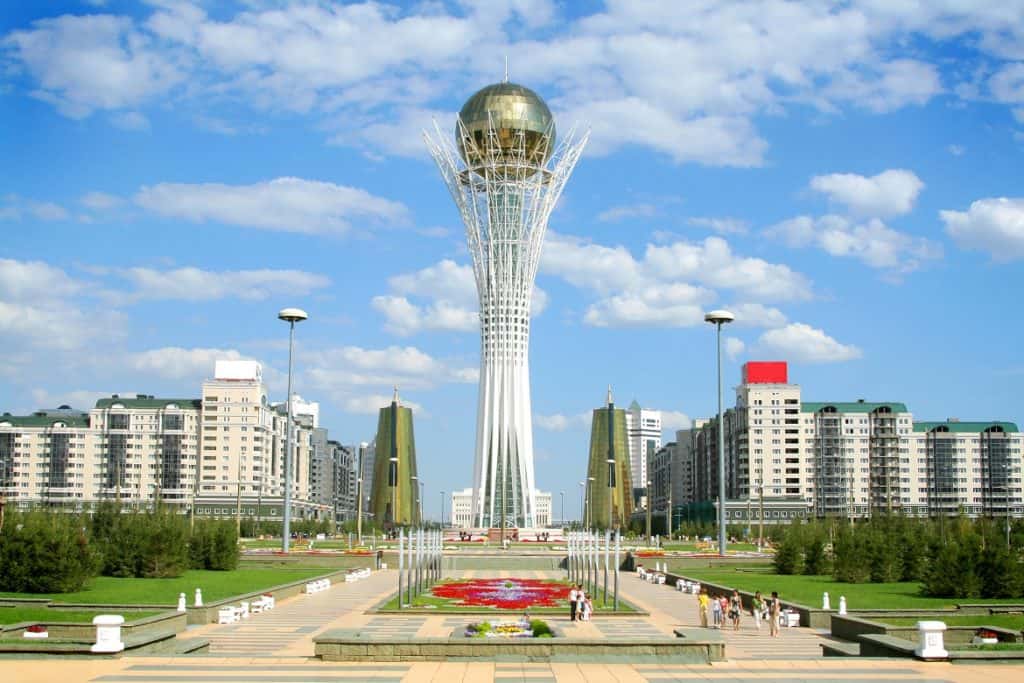The region of Central Asia has many several security and geopolitical challenges. And while the mainstream media is not paying much attention to this fragile region, countries such as Kazakhstan are still caught between Russia and the West.
The economic and infrastructure reforms in the last decade have significantly improved the living standard in this central Asian country. Yet, the increased cooperation between Kazakhstan and the EU and the traditional bonds with Russia put this former Soviet nation into the crossroad of big powers with geopolitical ambitions.
Traditional Bond with Russia
After the fall of the Soviet Union, the Kazakh nation was able to embrace its cultural and national heritage. Combined with that the Central Asian state inherited a solid infrastructure and industrial capacities which enabled a head start to their oil and resource-based economy. Since the fall of USSR, the Kazakh geopolitical policy was based on being a loyal ally to the Russian Federation. The cooperation was extended as Kazakhstan continued to lease the Balkhash Radar Station near Lake Balkhash, the Sary Shagan anti-ballistic missile testing range, and the Baikonur Cosmodrome space launch facility.
Moreover, the Russian influence in this former Soviet is active through the advanced military cooperation as the former Soviet Republic is a member of the Collective Security Treaty Organization. This military alliance represents the biggest regional organization that aims to protect the member states. The combined security efforts and the close cooperation have put Kazakhstan in a position to be dependent on the Russian leading role in the region. This also can be observed through the prism of the Shangai Cooperation Agreement where Kazakhstan is one of the members together with the Russian Federation.
The third notable element can be seen through the economic and cultural influence of Russia in Kazakhstan.
On that note, it is important to emphasize that Kazakhstan is also a member of the Russian-led Eurasian Economic Union. And while the financial andeconomic benefits of this membership were moderate, the former Soviet Republic was able to consolidate its independence and security. To be more specific, the central Asian state has a significant Russian population that is dominant in the Northern regions of the country. As we have seen with the annexation of Crimea and the conflict in Donbass, the possibility of Russian separatism should not be underestimated.
And while many Russians have left Kazakhstan in the last 30 years, their number is still above 20% of the total population in the country. All of these elements put Kazakhstan into the Russian sphere of influence. Having good political relations with the Russian Federation is the only way of securing the peaceful multiethnic society and its existence as an independent state. Furthermore, Astana has to take into account the political importance of such a large ethnic Russian community, which seems to be high on the agenda on the Russian geopolitical ambitions.
Nevertheless, it seems that the current Kazakh leadership is understanding the complex dependence from Russia as it took an active part in the Caspian Sea negotiations. Moreover, the Kazakh government has detrimental in concluding the deal as it isolated Iran which was the only state to have doubts about this agreement.
The Relations with the West
And while the economic benefits of being part of the Euroasian Union have been solid, it seems that the former Soviet state is increasingly improving its ties with the West. The Partnership and Cooperation Agreement with the EU represent the key framework for the ever-improving EU–Kazakhstan trade and political relations. This agreement has been in force since 1999. Moreover, the agreement from 2006 which was related to cooperation in the field of energy between the EU and Kazakhstan enhanced the relations between the two parties. Kazakhstan recognizes the increased economic and political integration as key to its modernization and development.
Based on the information from the World Trade Organization, the Kazakh economy is largely dependent on the trade deals with the European Union. Moreover, the European block is now Kazakhstan largest trading partner as close to 40% of its exports are heading for Europe. And while the EU has benefited from the cheaper energy supplies, the Kazakh state got the much-needed support from the EU for a full membership in the World Trade Organization. The exports to the EU are on the constant rise and the European investments in Kazakhstan are also increasing every year. The block is the largest foreign investor in the country.
Kazakhstan’s exports to the EU mainly energy-related, and exports from the EU are mostly machinery and other manufacturing equipment.
These elements lead us to the conclusion that the central Asian republic needs the EU as much as it needs Russia. These economic agreements can also lead to improved political relations which can affect the global and regional geopolitical situation.
Conclusion
It seems that Kazakhstan is heading in the right direction. The country is maintaining peaceful policies that are mostly aimed at integration and prosperity. Many may see the former Soviet republic on the crossroad between the east and the west. But it seems that the central Asian nation found the right balance between the two. By maintain close ties with Russia, Kazakhstan is able to maintain its national security and its political stability. In the same time, the cooperation in the energy sector with Russia enabled Kazakhstan to become one of the main players on the world stage.
And by forming a trade alliance with the European Union, the former Soviet republic is on the right track to improve its economic situation. All of these elements combined give Kazakhstan the potential to become one of the new economic giants in the 21st century.







